new posts in all blogs
Viewing: Blog Posts Tagged with: oxford music, Most Recent at Top [Help]
Results 1 - 6 of 6
How to use this Page
You are viewing the most recent posts tagged with the words: oxford music in the JacketFlap blog reader. What is a tag? Think of a tag as a keyword or category label. Tags can both help you find posts on JacketFlap.com as well as provide an easy way for you to "remember" and classify posts for later recall. Try adding a tag yourself by clicking "Add a tag" below a post's header. Scroll down through the list of Recent Posts in the left column and click on a post title that sounds interesting. You can view all posts from a specific blog by clicking the Blog name in the right column, or you can click a 'More Posts from this Blog' link in any individual post.

By: VictoriaD,
on 12/29/2015
Blog:
OUPblog
(
Login to Add to MyJacketFlap)
JacketFlap tags:
Music,
year in review,
Peter Hunt,
*Featured,
oxford journals,
Grove Music Online,
OUP music,
oxford music,
Life at Oxford,
Arts & Humanities,
John Rutter,
Bob Chilcott,
victoria davis,
Joel Sachs,
music 2015,
ben selby,
Add a tag
It's hard to believe, but another busy year at Oxford University Press has gone by. Join our music team as we take a look back at the year that was 2015, from new scholarship to new faces, with a combination of computers, cake, and chicken.
The post Highlights from Oxford Music in 2015 appeared first on OUPblog.

By: VictoriaD,
on 6/26/2014
Blog:
OUPblog
(
Login to Add to MyJacketFlap)
JacketFlap tags:
*Featured,
TV & Film,
film scores,
Arts & Leisure,
Grove Music,
Online products,
Grove Music Online,
oxford music,
Scott Huntington,
favor movie,
joe kraemer,
movie scoring,
scores,
kraemer,
for favor,
Music,
huntington,
oxford music online,
OMO,
independent films,
temp,
Film Music,
Add a tag
Ever wondered what goes into scoring film music? Is the music written during filming? Or is it all added after the film is finished? Regular OUPblog contributor Scott Huntington recently spoke with film composer Joe Kraemer about his compositional process, providing an inside look at what it’s like to score music for an independent film.
Scott Huntington: What’s your process of creation like?
Joe Kraemer: Ideally, I see the movie without any temp score, but these days, that is rare. [Director] Chris McQuarrie doesn’t like temp scores, so the two films I’ve done with him (The Way of the Gun, Jack Reacher) we skipped the temp process and I was able to work with a clean slate, so to speak.
I look at a scene, and based either on the cutting, the dialogue, or the rhythm of the scene, I find the spot where I believe music should come in. Then I roll on down until I think music should go out. I don’t use any hard and fast rules. A lot of it is based on feel.
Once I’ve decided where the music will start, I try and find the right tempo for the music, fast or slow. Next I consider the color of the music, light or dark, major or minor, brassy or strings, and so on. I continue on this path of binary decision-making until I reach a solution. If that solution doesn’t work, I work my way back and try something else, such as a faster tempo, a different color or a different instrumentation. Sometimes, I make decisions that don’t really have a logical explanation, but they just feel right. I like to refer to the scene in “Star Wars” where Ben Kenobi is cut down by Darth Vader, and John Williams scores the sequence with a sweeping version of Princess Leia’s Theme, because that theme has great sweep and scope, and Ben’s theme was more somber. His decision seems nonsensical from a logical point of view, but it’s right-on from an emotional point of view.
Scott Huntington: Have you seen changes in technology impact the way you score movies?
Joe Kraemer: Well, the AVID editing system has opened up the audio side of things for film editors completely. As a result, films are built with really well-edited temp scores right from the get-go. In the old days, a Moviola or a flat-bed had one or two tracks of sound, so the temp score was something that was laid in very bluntly, just to create a feeling or atmosphere, without it needing to be a definitive presentation. Now, the ability to edit the temp score to match the picture in minute detail has resulted in everyone accepting it as the baseline standard for the film. The editor cuts the scene to the temp, the director looks at the cut with the temp, right away the temp is now the point of comparison for the rest of the process. Even if the composer never sees the temp, he or she is competing with it. The composer’s music is evaluated as much for whether it matches the temp as whether it works for the scene in the first place.
What you end up with is the picture-editor making a lot of the decisions about the music before the composer even has a shot at bringing something of himself (or herself) to the table. That isn’t inherently bad, picture editors usually have great taste in music, but as a composer it can feel restrictive. Also, you end up with a lot of films sounding the same, because all the editors fall in love with the same piece of music at the same time. Case in point, for about 10 years after “American Beauty” came out, all I heard in temp scores was Tom Newman’s score for that movie. There are only so many ways one can reinvent piano chords over sustained string beds.
As far as the composing work itself, for me the computer-based paradigm has been a life-saver. From adjusting tempos to catch cuts, to mixing electronic sounds with acoustic sounds, computer-based composing has made it possible for me to make a living as a composer, even when films have had skimpy music budgets, because I can do all of the work myself. I don’t use an assistant; I don’t have a team of ghost-writers. I put all my time and effort into making the score as good as possible myself, within the means at my disposal. Technology makes that possible.
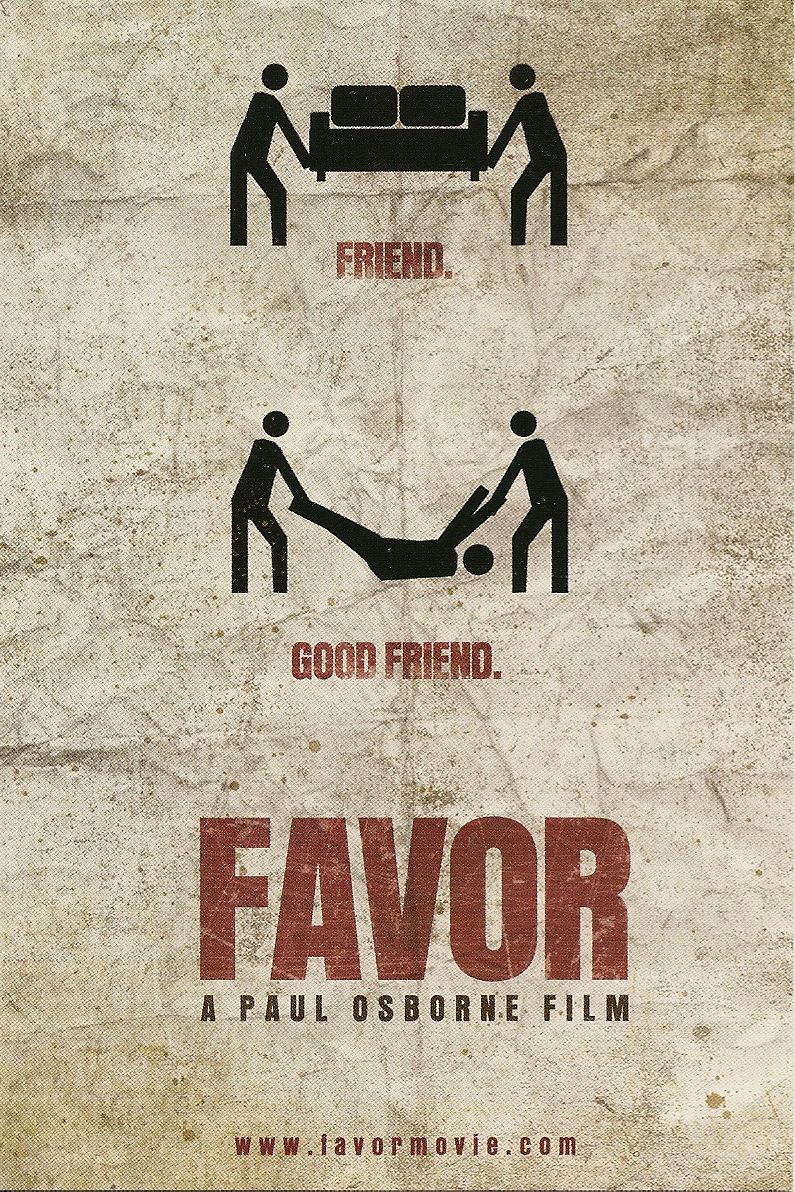 Scott Huntington: Describe the process of writing the music for Favor.
Scott Huntington: Describe the process of writing the music for Favor.
Joe Kraemer: The process starts as soon as the movie is over the first time I see it. I immediately begin thinking about different aspects of the score: what will the instrumentation be? What will the mood be? The tone?
Next comes a period of living with the film. If possible, I get a copy and watch it on repeat for a day or two in my studio while I update my software and do busy work, etc. Once I’ve seen the film a dozen times or so, it’s time to start composing in earnest.
At some point between seeing Favor the first time and getting my own copy to work from, I was swimming in the pool and doodling melodies in my head and I came up with a nice little tune I though would sound pretty on the cello. I made a mental note of it and filed it away in my noggin for some later use.
Some time later, as I sat down to begin writing the cues for Favor, I remembered that melody and found that on a piano, it had a cold sound that contrasted nicely with the beauty of the tune. This seemed to be appropriate for my needs, as I was writing a theme for a character that, rarely seen, hangs over the film like a specter. This contrast of cold and beauty felt right.
Next, I decided I needed some kind of musical “sound effect” to help with certain story elements I wanted the score to reinforce. This was the impetus behind what [director] Paul [Osborne] and I began to call the “Abby Stab”. It’s a sound of a hammer hitting an anvil that has been tweaked with a bunch of plugins. I used it whenever I wanted to audience to think of Abby, to be reminded of her fate, to keep her present in a scene even when she wasn’t there.
After that, it was mostly a task of assembling the music to match what Paul laid out in his temp score. Paul cuts his own films and I know from working with him the past that he is very particular about the way his temp interacts with the editing of the film, so I worked very hard to stay faithful to the way he would crescendo to a cut. That being said, there were major sequences where Paul had no temp score, but I added music because I thought it was an effective spot.
Scott Huntington is a percussionist specializing in marimba. He’s also a writer, reporter and blogger. He lives in Pennsylvania with his wife and son and does Internet marketing for WebpageFX in Harrisburg. Scott strives to play music whenever and wherever possible. Read his previous blog posts and follow him on Twitter at @SMHuntington.
Oxford Music Online is the gateway offering users the ability to access and cross-search multiple music reference resources in one location. With Grove Music Online as its cornerstone, Oxford Music Online also contains The Oxford Companion to Music, The Oxford Dictionary of Music, and The Encyclopedia of Popular Music.
Subscribe to the OUPblog via email or RSS.
Subscribe to only music articles on the OUPblog via email or RSS.
The post Scoring independent film music appeared first on OUPblog.


By: Julia Callaway,
on 5/8/2014
Blog:
OUPblog
(
Login to Add to MyJacketFlap)
JacketFlap tags:
metropolitan opera,
*Featured,
oxford journals,
Arts & Leisure,
oxford music,
smyth,
Christopher Wiley,
Der Wald,
Ethel Smyth,
Music & Letters,
Musical Quarterly,
smyth,
9180,
ethel,
Music,
History,
Biography,
Journals,
opera,
Virginia Woolf,
Add a tag
By Christopher Wiley
The 8th May marks the seventieth anniversary of the death of Dame Ethel Smyth (1858-1944), the pioneering composer and writer, at her home in Hook Heath, near Woking. In the course of her long and varied career, she composed six operas and an array of chamber, orchestral, and vocal works, challenging traditional notions of the place of women within music composition. In her later years she found a second calling as an author of auto/biographical and polemical writings, publishing ten books between 1919 and 1940.
Smyth led a fascinating and unconventional life. Having resolved at an early age to enter the music profession, she overcame opposition from her father (an army general) in order to enrol at the Leipzig Conservatorium in 1877. During her years in Continental Europe she came into contact with Brahms, Clara Schumann, Grieg, and Chaikovsky. Returning to England in the late 1880s, her compositions attracted much attention in the years and decades that followed, from influential figures including Empress Eugénie, Lady Mary Ponsonby, Queen Victoria, Princesse de Polignac, and, in the field of music, Thomas Beecham, Bruno Walter, Adrian Boult, Henry Wood, Donald Tovey, and George Bernard Shaw. She received honorary doctorates from the Universities of Durham and Oxford, and was awarded the DBE in 1922.
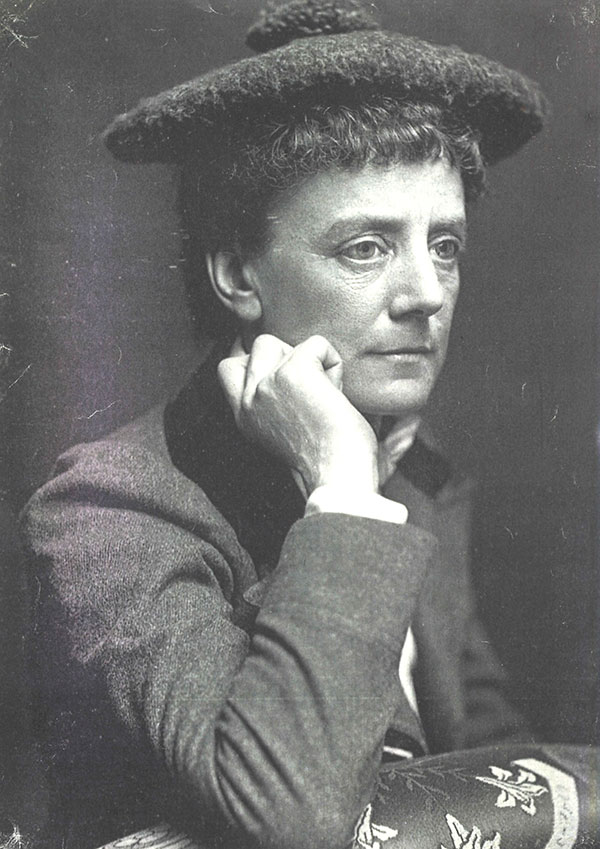
Ethel Smyth, 1908. Lewis Orchard Collection Ref.9180, courtesy of Surrey History Centre.
This intriguing artist has been a subject of my research for over a decade, leading to my article “Music and Literature: Ethel Smyth, Virginia Woolf, and ‘The First Woman to Write an Opera’” recently published in The Musical Quarterly (itself a companion-piece to an article I published in another Oxford journal, Music & Letters, in 2004). My particular interest lies in Smyth’s relationship with the novelist Virginia Woolf (1882-1941), whom she befriended in 1930 and with whom she maintained a lively correspondence that provides many valuable insights into Smyth’s activities as memoirist and polemicist, and, more widely, into the differences between their respective disciplines.
Smyth may not have been the first ever woman to write an opera, as Woolf erroneously suggested in the quotation that inspired my article (that distinction goes to Francesca Caccini, over 250 years earlier). But she was nonetheless a pathbreaking individual in many different respects. To commemorate the anniversary of her passing, here follow five facts about Ethel Smyth, some well known, others less so, illustrating ways in which she made history in music, politics, and literature.
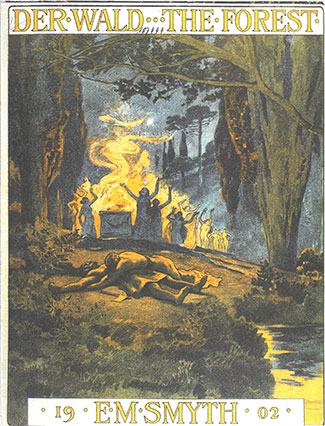
Front cover of Ethel Smyth Der Wald, 1902. Lewis Orchard Collection Ref.9180, courtesy of Surrey History Centre.
1. Smyth is the only woman composer to date to have presented an opera at The Met. The performances of her second opera, Der Wald (The Forest), on 11 and 20 March 1903 yield the only instance out of over 300 different works given at The Metropolitan Opera, New York City between October 1883 and July 2013 to have been composed by a woman. According to one contemporary account, the opera was attended by “one of the largest and most brilliant audiences” of the season, eliciting applause that “continued for ten or fifteen minutes, surpassing even the most generous for which the opera patrons are distinguished.”
2. Smyth withdrew one of her operas during its performance run in a move she believed to be “unique in the annals of Operatic History.” For the première of her third opera, Standrecht (The Wreckers), at the Neues Theater, Leipzig in November 1906, she stipulated that no revisions to the score should be made without her consent. However, she discovered the day before the dress rehearsal that Act III had been extensively cut, and her pleas for reinstatement of the excised material were in vain. In response, following the first performance she removed all of her music from the orchestra pit and took it to Prague, where the opera had already been accepted for performance — though this turned out to be a woefully under-rehearsed fiasco.
3. Smyth became a leading suffragette in the early 1910s. In September 1910 she met, and became enchanted by, Emmeline Pankhurst. She pledged to devote two years of her life to the women’s suffrage campaign, and a close friendship developed between the two women (Woolf even believed they had been lovers). Smyth’s work for the “Votes for Women” movement is reflected in much of the music she composed at that time, not least The March of the Women, which came to be adopted as the suffragette anthem. She was said to have once stormed into 10 Downing Street and hammered out the March on Prime Minister Asquith’s piano while the Cabinet was in session.
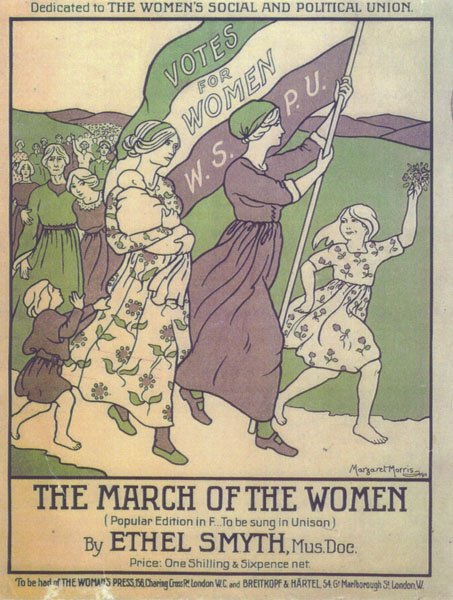
Image: Lewis Orchard Collection Ref.9180, courtesy of Surrey History Centre
4. Smyth served a jail sentence for her suffrage activity. She was one of some 200 women arrested on 4 March 1912 as a result of a co-ordinated window-smashing campaign across the West End of London, and was sentenced to two months in Holloway Prison. Smyth had chosen to target the Berkeley Square home of the colonial secretary, Lewis Harcourt, in retaliation for a remark he had made along the lines that “if all women were as pretty and as wise as his own wife, [they] should have the vote tomorrow.” She recounted the episode on the BBC National Programme in 1937, in interview with the author Vera Brittain.
5. Smyth kept a series of dogs for over fifty years. Her first dog, given to her in 1888, was a St Bernard cross called Marco, who travelled everywhere with her. In 1901, a friend presented her with an Old English sheepdog puppy she named Pan, who became the first in the line of sheepdogs she successively numbered Pan II, Pan III, up to Pan VII. Her lesser-known book Inordinate (?) Affection: A Story for Dog Lovers (1936), a collected biography of some of her canine companions, stands alongside such classics as Virginia Woolf’s Flush and Jack London’s The Call of the Wild as famous examples of dogs in literature.
Christopher Wiley is Senior Lecturer in Music at the University of Surrey, UK. His research primarily examines musical biography and the intersections between music and literature. Other interests include music and gender studies, popular music studies, and music for television. He is author of “Music and Literature: Ethel Smyth, Virginia Woolf, and ‘The First Woman to Write an Opera’” published in The Musical Quarterly. Follow Christopher Wiley on Twitter. Read his blog. He can also be found on Scoop.it!.
The Musical Quarterly, founded in 1915 by Oscar Sonneck, has long been cited as the premier scholarly musical journal in the United States. Over the years it has published the writings of many important composers and musicologists, including Aaron Copland, Arnold Schoenberg, Marc Blitzstein, Henry Cowell, and Camille Saint-Saens. The journal focuses on the merging areas in scholarship where much of the challenging new work in the study of music is being produced.
Subscribe to the OUPblog via email or RSS.
Subscribe to only music articles on the OUPblog via email or RSS.
The post Five facts about Dame Ethel Smyth appeared first on OUPblog.


By: VictoriaD,
on 4/1/2014
Blog:
OUPblog
(
Login to Add to MyJacketFlap)
JacketFlap tags:
Deane Root,
Grove Music,
Online products,
Grove Music Online,
oxford music,
Anna-Lise Santella,
Charles Hiroshi Garrett,
fake article contest,
spoof contest,
Music,
april fools,
gmo,
oxford music online,
*Featured,
Arts & Leisure,
Add a tag
By the Grove Music Online editorial team
Just in time for April Fool’s Day we are pleased to announce the results of this year’s Grove Music Online Spoof Article contest.
This year’s submissions were all biographies, perhaps because Grove’s stylistic prescriptions for biographies lend themselves well to parody. Competition was fierce and hilarious. One of our judges reports, “You all made me spill my coffee. Twice.”
The judges:
- Deane Root, editor in chief of Grove Music Online, and Professor of Music, Director and Fletcher Hodges, Jr. Curator of the Center for American Music, University of Pittsburgh, has been immersed in Grove style since he worked under Stanley Sadie on the first New Grove Dictionary of Music and Musicians.
- Charles Hiroshi Garrett, Associate Professor of Musicology at the University of Michigan School of Music, Theatre & Dance served as editor in chief for The Grove Dictionary of American Music, Second Edition. He is currently working on Joking Matters, a book that explores music, humor, and contemporary culture.
- Anna-Lise Santella edits Grove Music/Oxford Music Online as well as the music modules of Oxford Bibliographies and Oxford Handbooks Online. She spends a lot of time with style guides and once read the 1927 edition of Grove cover to cover for fun.
We received a number of excellent selections, all of which observed Grove style and took care to include some plausible details among the ludicrous so that they might pass muster.
Judge Root noted, “It’s very difficult to choose among these four offerings. Indeed, in wit and prose most seem to have flowed from the fingertips of the same inspired author.” Judge Root was right about that: Three of our four shortlisted articles were written by a single author. Root added, “This year brings us brief biographical entries, thumbnail sketches of inspired beings in whom some of us might find our imaginary Doppelgänger.”
***
Third runner up:
Bach, Davide Adolphus Iestyn (b Rimsting, Bavaria 29 Feb 1764, d Merthyr Tydfil, Wales 22 Apr 1833), German composer, organist, and political agitator. A distant relative of J.S. Bach, D.A.I. Bach’s early career is veiled in obscurity. It is known from the personal letters of his father, Johann Maldwyn Bach (1740 – 1800) that D.A.I. Bach moved to the home of his paternal great grandmother in Fochriw, Wales in 1785 following a failed attempt to poison the Elector of Rimsting in protest about the feudal laws still employed in Bavaria at that time. He is credited with establishing the tradition of Lutheran hymn singing in Wales, translating Ein Feste Burg into Welsh for the Eisteddfod at Corwen in 1789. His most famous work is the ‘Steam’ Cantata (Schnell, Schneller, am Schnellsten!) written to celebrate the first journey of Richard Trevithick’s steam engine from Merthyr Tydfil to Penydarren in 1804. He was implicated as a ring leader of the Merthyr Riots of 1831, describing himself as a ‘solider for freedom’. He escaped punishment by disguising himself as an iron worker at the famous Dowlais works. His opera Uumo di Ferro, a semi-autobiographical account of this episode, was revived in 1987 as part of the Urdd Eisteddfod in Merthyr Tydfil. Bach’s involvement in Welsh political protest earned him a reference in the folk song Sospan Fach (‘D.A.I. Bach y sowldiwr’). In a cruel twist of fate, D.A.I. Bach died on the same day as Trevithick in 1833, following a railway accident.
Bibliography
ed. Llewellyn Ein Brief Aus Rimsting: the letters of Johann Maldwyn Bach (Treorchy, 1933)
Cyfansoddiadau llenyddol buddugol: Eisteddfod Genedlaethol Urdd Gobaith Cymru, Merthyr
Tudful a’r Cylch 1987 (Cardiff 1987)
V. Jones The Iron Men of Merthyr (Bangor, 2009)
Root notes, “Another long-lost member of the prolific family: a cwrthed Bach perhaps? Surely those lacking facility with the Welsh language are missing some humor here (“dai bach” means little David, raising expectations for references to slingshots and giants).” Judge Santella added, “This article gets bonus points for including references to actual events that leant it the air of plausibility and for including Welsh phrases that stood up to my (admittedly limited) translation abilities. It lacked, however, a signature, which is not only a missed opportunity for additional hilarity, but also against Grove’s preferred style for an article that includes bibliography. This article was submitted by Steven Griffin.
***
Second runner up:
Humble, Maria Felicity (b Hampshire, 1762, d Hampshire, 1813). English composer and pianist. Initially denied the musical tuition bestowed on her four brothers, Humble was eventually permitted to attend lessons by her parents, a vicar and his wife, after her threat to hold her breath for a dangerously long time led to an incident in which the parish doctor had to be called, at considerable expense and embarrassment to the family. This was the last in a series of subversive acts undertaken by Humble in protest at her exclusion; others included doctoring her father’s sermons shortly before church services, resulting in some unfortunate declarations from the pulpit.
Humble proved to be skilful and naturally musical, soon outstripping her brothers in her aptitude at the keyboard, and in her understanding of harmony, counterpoint, singing, and composition. The resultant humiliation felt by her brothers manifested itself in a number of resentful gestures, including the destruction or defacement of many of Humble’s scores. Of those that survive, most bear the marks of sibling rage, with one set of handwriting in particular – identified to be that of her youngest brother, Percy – revealing a highly scatological mind.
Humble resorted to keeping her works locked in a bureau; as a consequence, none were performed or published during her lifetime. Pieces include numerous highly accomplished songs and piano sonatas, some of which have been hailed by Charles Rosen as ‘superior even to Beethoven’.
Bibliography
C. Rosen, Forgotten Classical Masters (London and New York, 1972), 56–62
F. Tinkle, From Humble Origins to an Even Humbler Reputation (London, 1964)
JOSEPH KERMA
Judge Root observes, “Reflecting timely concerns about sexist male suppression of female creativity and sibling rivalry among composers, this bio presents a remarkable amount of familial dirty linen for someone whose birth and death dates are unknown, and draws in two late male authorities who might have been reluctant to be associated with this Humble musician, no matter the sardonic Felicity.” Judge Santella concurs that the level of detail combined with the signature would have made her suspicious. “This would not have gotten by us, but I am 100% in favor of the title of F. Tinkle’s biography.”
***
First runner up:
Fogger-Houndsmilk, George (b Guildford, 24 August 1937, d Kingston upon Hull, 26 December 1999). English composer, pianist and folksong collector. He was educated at Winchester College and then at Hull, where he encountered the poet Philip Larkin (1922-1985). Fogger-Houndsmilk, who was published under the name George Houndsmilk, set Larkin’s poetry to music in his song cycle, The Librarian (1956), but Larkin dismissed him as ‘a second-rate churner of dubious ditties’. The cycle was published incorrectly as The Libertarian, but was so successful in that guise that Houndsmilk made no attempt to alter the title in later editions.
Houndsmilk enjoyed considerable commercial success with his settings of English folk music. Songs include Rosemary Cheesecloth, Plump Puddens, Bishop Littlebreath’s Farewell, The Saucy Skipper of Scarborough, Lewisham Fair, Shropshire Blue, Sweet Catford Sue, Newcassel Town Hall, The Red-breasted Merganser of Merseyside, Slippy Willie, and Seven Farmers Went A-Drinking and Never Came Back. Houndsmilk’s settings were issued by the eminent publisher Henry Cassocks.
Houndsmilk married Hattie Bloxham, a former barmaid celebrated for her forthright singing style. Bloxham gave numerous recitals of Houndsmilk’s songs, with her husband at the piano. They had six children, including the poet and literary critic Celia Bloxham-Houndsmilk. George Houndsmilk died of injuries sustained during the collapse of a negligently-constructed wheelbarrow.
Bibliography
S.L. St Bernard: To Hull and Back: The Cultural Life of England’s Most Underrated City (Cambridge, 1972), 72–81
M. Bowdler: Plump Puddens: The Tawdry World of George “Foggy” Houndsmilk and Hattie Bloxham (London, 1991)
VALERIE LANGFIELD
“Those consummate British folksong collectors with their school ties and countrified lineage; where does the real end, and the imaginary begin?” asked Judge Root. “With Larkin as the poet one might have expected this composer to jazz it up, but the list of cheesy settings reveals other interests. And what the composer was doing beneath the barrow we’d best not know.”
***
And the winner is:
Henderson, Lucas John (b Philadelphia, 19 June, 1910, d Appenzell, Switzerland, 27 November, 1987). American composer. His style encompassed the avant garde and, later, post-modernism, including works which paid tribute to, or satirised, the music of other composers. His 1956 piece, Cage, an homage to John Cage, consists of a cage, the bars of which have been loosely interwoven with violin strings. The performer, who need not be a violinist, is required to pluck the strings while emulating the movements of a bird. In a follow-up to this work, Byrd-Cage (for performer, cage and tape, 1958), a recording of Byrd’s motet Siderum rector is played throughout the performance. When the original score to Henderson’s satirical fusion of Stravinsky and Beethoven, Oiseau de für Elise (for voice and Bunsen burner) was destroyed by fire, Henderson ceased composing altogether, retiring to a life of quiet solitude in the Swiss village of Appenzell.
Bibliography
N. Doggerel, The Anechoic Chambers of the Mind (New York, 1967)
KEITH G. GRAFING
Judge Root opined, “The name puns here are surprising and delightful, as are the inventively prepared birdcage and the implied hazards of modern-music performance. This mashup of music composers, styles, and titles—brief though it be—earns my nod as our spoof-of-the-year.” The rest of the judges agreed. “It’s the only one that made me laugh out loud,” said Judge Garrett, and Judge Santella admitted it was the perpetrator of the aforementioned coffee incident.
***
Congratulations to author Joanna Wyld, who also wrote the First and Second runner up entries. She is the winner of $100 in OUP books and a year’s subscription to Grove Music Online.
Many thanks to all of our entrants for your creativity! We hope you’ll join us again next year!
And finally, our original contest announcement elicited our first ever errata correction for an earlier spoof article. William Walderman wrote to correct the article on Dag Esrum-Hellerup, which appeared in the first printing of New Grove 1.
Original:
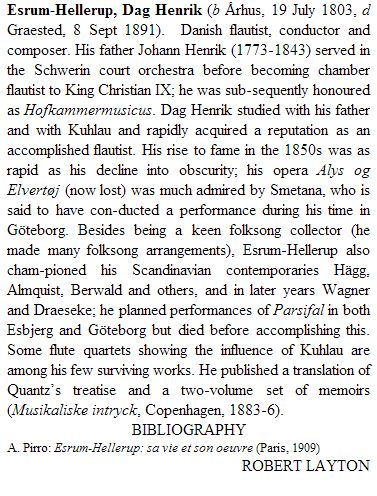
William Walderman:
The Grove article on Dag Henrik Esrum-Hellerup contains a serious flaw. Dag Henrik’s father, Johann Henrik (1773-1843), supposedly appointed chamber flautist to Christian IX, died 20 years before Christian’s accession to the throne in 1863.
We tried to slip one by him by stating that it must have been Johann Henrik’s long lost identical twin brother, Johann Maria, who lived to the ripe old age of 110, that served under Christian IX, but he was too quick for us!
Are you sure it was Johann Maria – a Catholic name in a Protestant country? With the surname Esrum-Hellerup, these twins weren’t arrivals in Denmark from Bavaria or the Electoral Palatinate. Maybe his name was Johan Martin Esrum-Hellerup (probably Johan, with just one n, or else Hans or Jens).
It’s certainly difficult not to admire the lungs of a 90-year old flautist.
We certainly can’t argue with that. Thanks for your comments, Mr. Walderman!
Oxford Music Online is the gateway offering users the ability to access and cross-search multiple music reference resources in one location. With Grove Music Online as its cornerstone, Oxford Music Online also contains The Oxford Companion to Music, The Oxford Dictionary of Music, and The Encyclopedia of Popular Music.
Subscribe to the OUPblog via email or RSS.
Subscribe to only music articles on the OUPblog via email or RSS.
The post April Fool’s! Announcing winner of the second annual Grove Music spoof contest appeared first on OUPblog.


By: Julia Callaway,
on 3/18/2014
Blog:
OUPblog
(
Login to Add to MyJacketFlap)
JacketFlap tags:
Music,
adirondack,
composer,
harp,
*Featured,
Arts & Leisure,
hilary,
oxford music,
From Afar,
Hilary Tann,
Johann Sebastian Bach,
John Buller,
Nothing Forgotten,
Roberto Gerhard,
The Moor,
Turlough O'Carolan,
William Matthias,
tann,
composer hilary,
bach cello,
especially libra,
Add a tag
We asked our composers a series of questions based around their musical likes and dislikes, influences, challenges, and various other things on the theme of music and their careers. Each month we will bring you answers from an OUP composer, giving you an insight into their music and personalities. Today, we share our interview with composer Hilary Tann.
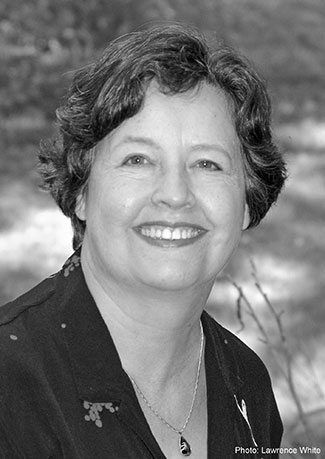
Hilary Tann, photo credit: Lawrence White.
Praised for its lyricism and formal balance, Hilary Tann’s music is influenced by her love of Wales and a strong identification with the natural world. A deep interest in the traditional music of Japan has led to private study of the shakuhachi and guest visits to Japan, Korea, and China. Her compositions have been widely performed and recorded by ensembles such as the European Womenʼs Orchestra, Tenebrae, Lontano, Meininger Trio, Thai Philharmonic, Royal Liverpool Philharmonic, BBC National Orchestra of Wales, and KBS Philharmonic in Seoul, South Korea.
Which of your pieces are you most proud of and/or holds the most significance to you?
The large orchestral work, From Afar, comes to mind immediately. I especially enjoyed the Korean Broadcast Symphony performance because it captured the sense of the traditional music of Japan so well. From the chamber music repertory, Nothing Forgotten (piano trio) stands out as an Adirondack piece, and from the choral repertory, The Moor (SA) recalls Wales and my interest in sacred music.
Which composer were you most influenced by and which of their pieces has had the most impact on you?
In the early days I was influenced by the music of Roberto Gerhard, especially Libra, Hymnody, and the Concerto for Orchestra. In fact, I began postgraduate work with Jonathan Harvey in Southampton University, studying Gerhard’s oeuvre, and it was this work which initially took me to Princeton University in the United States.
Can you describe the first piece of music you ever wrote?
The Wye Valley for piano. When he interviewed me for BBCWales, Ian Skidmore called this “the beginning of my tradition of being inspired by nature”. I responded that at age 6 I wasn’t thinking that I was beginning a tradition!
If you could have been present at the premiere of any one work (other than your own) which would it be?
Monteverdi’s Vespers of 1610 — all the pageantry, all those timbres, wonderful!
What might you have been if you weren’t a composer?
A geologist. I grew up when plate tectonics were coming into the public eye and, coming from Wales, rocks have always excited me. But actually, writing music has been at the forefront ever since I can remember.
What is your favourite piece of music in the OUP catalogue that isn’t yours?
Hard to say. . . lots . . . but I loved William Matthias‘s Symphony No. 2 (Summer Music) when I first heard it, and John Buller‘s Theatre of Memory bowled me over on first listening.
Is there an instrument you wish you had learnt to play and do you have a favourite work for that instrument?
Harp — not so much the Romantic harp, but the works of Turlough O’Carolan — Celtic harp. In fact I did take lessons some 20 years ago before writing From the Song of Amergin (fl, va, hp) and I really enjoyed getting to know the 43-string instrument. (My main instruments are piano and cello, but my hands are small for these, whereas I’m told have “good” harp hands. Perhaps one day I can return to this haunting sound world.)
Is there a piece of music you wish you had written?
The Bach Cello Suites — especially the preludes and sarabandes. I’ve always loved the narrative solo line and enjoy writing pieces for solo instruments. In fact, I’ve just completed Seven Poems of Stillness for Guy Johnston (Gregynog Festival, June 2013).
Welsh-born composer Hilary Tann lives in the foothills of the Adirondack Mountains in upstate New York where she is the John Howard Payne Professor of Music at Union College, Schenectady. She holds degrees in composition from the University of Wales at Cardiff and from Princeton University. From 1982 to 1995 she held a number of Executive Committee positions with the International League of Women Composers. She was guest Composer-in-Residence at the 2011 Eastman School of Music Women in Music Festival and will be composer-in-residence at the 2013 Women Composers Festival of Hartford.
Subscribe to the OUPblog via email or RSS.
Subscribe to only music articles on the OUPblog via email or RSS.
The post Composer Hilary Tann in eight questions appeared first on OUPblog.

Compiled by Anwen Greenaway
2012 has been an eventful year for the OUP music teams. We’re in reflective mood as the year draws to a close, so we thought we’d share our highlights of 2012.
January
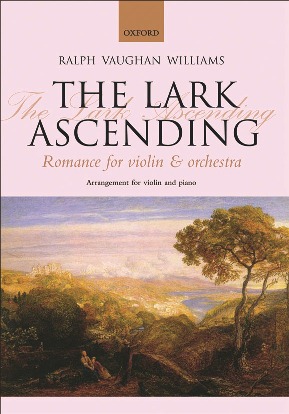 OUP’s most popular classical music publication had a documentary dedicated to it on BBC TV — “The Lark Ascending: the nation’s favourite piece of classical music” discussed the history of the work, and also included a complete performance of the fantasia for solo violin and orchestra.
OUP’s most popular classical music publication had a documentary dedicated to it on BBC TV — “The Lark Ascending: the nation’s favourite piece of classical music” discussed the history of the work, and also included a complete performance of the fantasia for solo violin and orchestra.
February
World premiere of McDowall’s musical tribute to Scott of the Antarctic’s ill-fated expedition, Seventy Degrees Below Zero. The new work for tenor and orchestra was performed alongside Vaughan Williams’s Sinfonia Antartica, in a concert which featured “Downton Abbey”’s Hugh Bonneville (which caused great excitement!).
March
OUP composer Richard Causton was appointed lecturer in Music Composition at Cambridge University, one of the world’s most prestigious music teaching jobs.
April
Launch party for Groove Music: The Art and Culture of the Hip-Hop DJ by Mark Katz at our New York office, complete with DJs, a turntable, and an appearance by legendary DJ GrandWizzard Theodore.
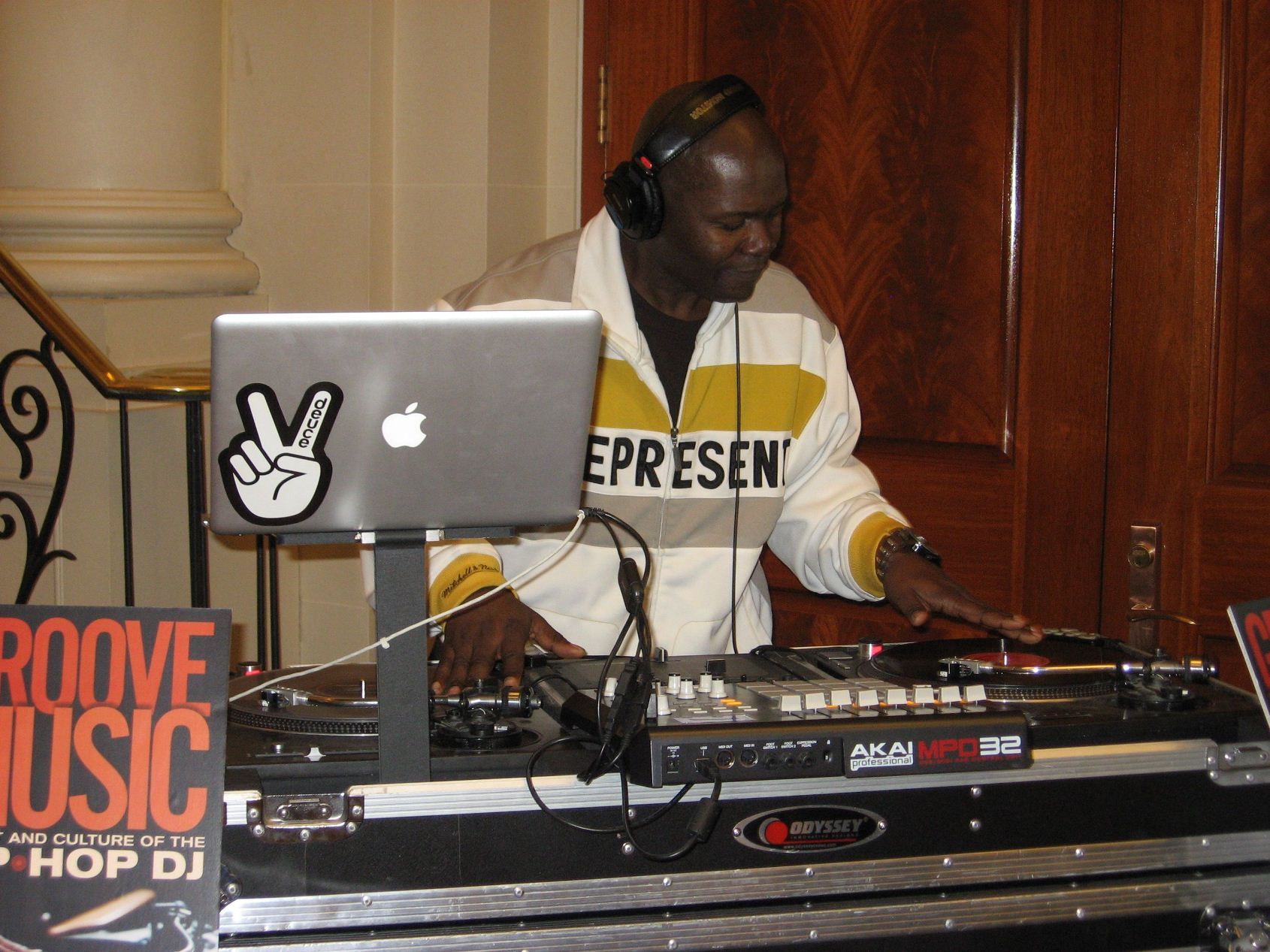
May
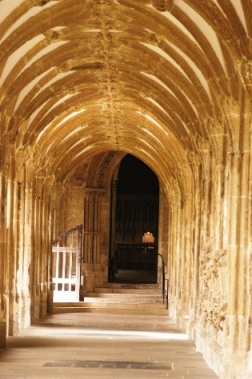
Wells Cathedral
OUP composer Michael Finnissy’s Sincerity — his choral anthem commissioned for The Choir Book for the Queen — was premiered in the lovely surroundings of Wells Cathedral. The Choir Book for the Queen is a collection of contemporary anthems compiled and commissioned to mark the Diamond Jubilee of Her Majesty Queen Elizabeth II.
June
Oxford Music launched on Twitter and gained 100 followers in the very first day. Follow us @OUPMusic.
The first public performance of Vaughan Williams’s Fantasia for Piano and Orchestra took place in the UK. Although the piece was composed in 1896 it had never been published until this year. It is the composer’s first known work for solo instrument.
Composer Will Todd wrote a new piece of choral music which was included in the Queen’s Diamond Jubilee service. Choristers from St Paul’s and a ‘Diamond Choir’ of young singers from around the UK performed The Call of Wisdom at St Paul’s Cathedral in London. We interviewed Will about it on our blog.
Anwen Greenaway (Promotion Manager) got married in Oxford, and was thrilled to receive a specially written Wedding Fanfare from composer Howard Skempton. He even turned up on the day to perform it with Anwen’s niece!
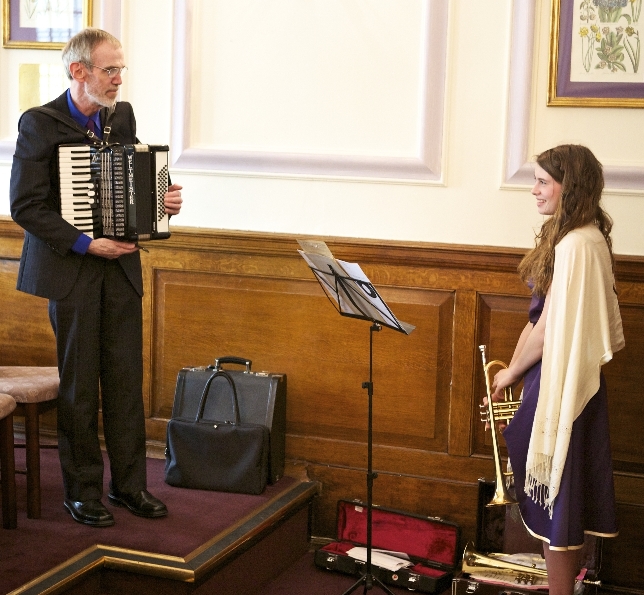
Howard Skempton and Anwen’s niece
Anna-Lise Santella (Editor of Grove Music/Oxford Music Online) won on the hit US quiz show “Jeopardy”! She won two days in a row on June 27th and 28th.

Anna-Lise on Jeopardy
July
The Southbank Centre in London was taken over by the New Music 20×12 team for a whole weekend in July. New Music 20×12 commissioned 20 twelve minute pieces of music from the UK’s leading composers to celebrate the talent and imagination of the UK’s musical community as part of the London 2012 Cultural Olympiad. OUP composers Howard Skempton and Richard Causton were both commissioned and their new pieces were included in the weekend celebration of the project.
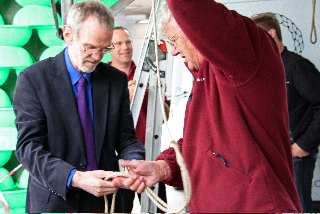
Howard Skempton trying bell ringing at the Southbank Centre
The London Olympics were the highlight of 2012 for lots of the UK-based team. Lucy Allen (Print and Web Marketing Assistant) went to the fencing and Anwen Greenaway (Promotion Manager) went to the athletics. Seeing the world’s best athletes competing was mesmerising!

August
Chilcott’s The Angry Planet had its world premiere at the Royal Albert Hall in London as part of the 2012 BBC Proms concerts. The work was the largest piece commissioned for the proms this year and the concert was broadcast live on TV.
Richard Causton’s New Music 20×12 commission Twenty-Seven Heavens was performed in Amsterdam, Edinburgh, and Darmstadt by the European Youth Orchestra on their summer tour.
Click here to view the embedded video.
We were excited when Olympic swimmer and gold medalist Dana Vollmer linked to our blog post by Gerald Klickstein about how musicians and athletes can excel under pressure.
Our very own OUP history editor and author Nancy Toff won the 2012 National Service Award from the National Flute Association.
September
American dream pop band Asobi Seksu retweeted our post about Colony Records closing. It was a pretty exciting moment for our music book marketer, who is a fan!

October
Animation insider Daniel Goldmark visited the OUP office in New York to talk about music in Pixar films (including how music makes the beginning of Up so darn sad).
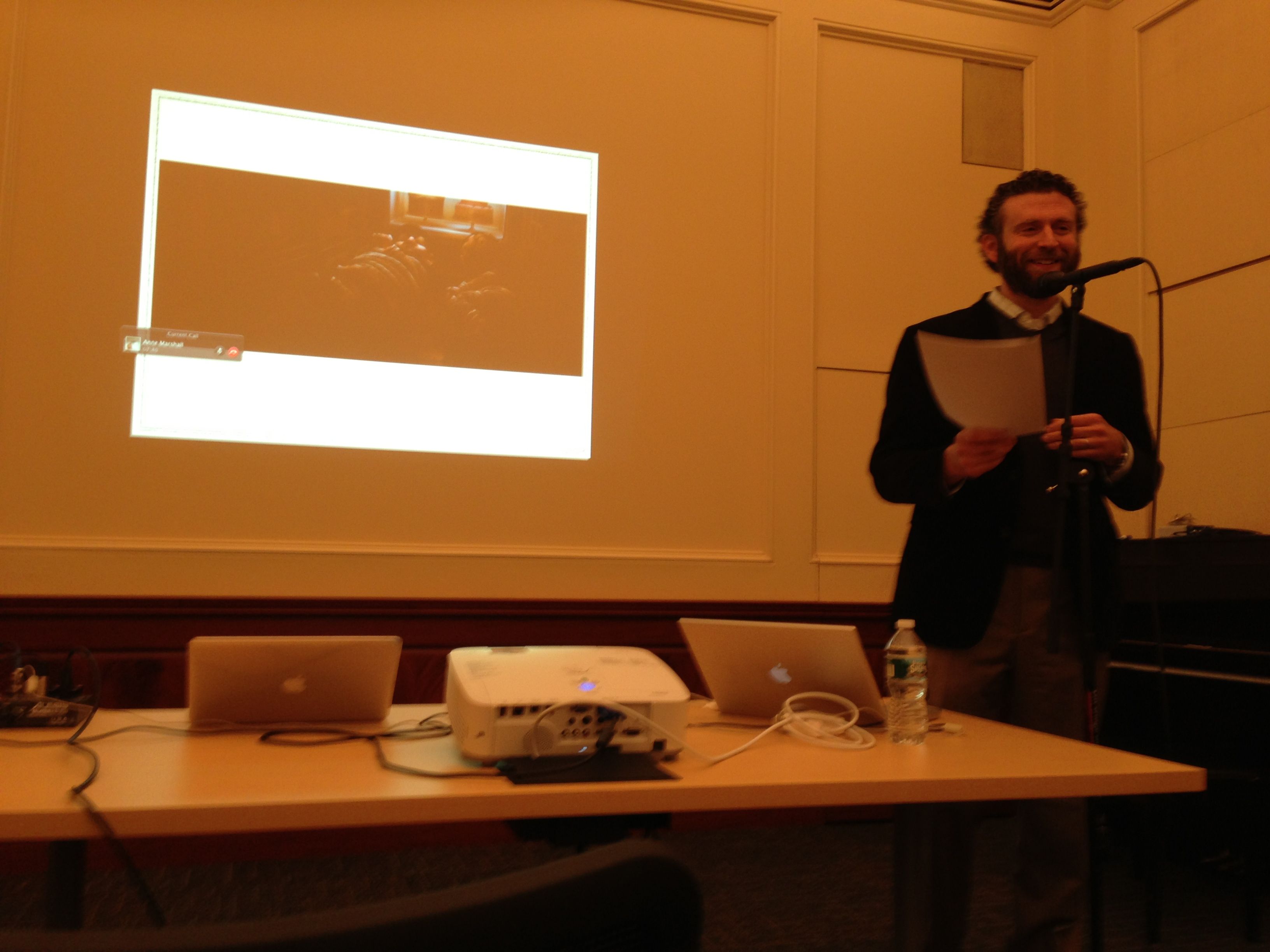
Kathryn Marsh’s The Musical Playground won the American Folklore Society’s Opie Prize.
The ASCAP Awards were announced, and three OUP titles won:
November
Vaughan Williams’s opera The Pilgrim’s Progress was performed at English National Opera: a rare treat, as the opera has only been performed handful of times since its premiere in 1951. OUP staff were thrilled to attend some of the performances!
Oxford Handbooks Online in Music launched. Oxford Handbooks Online in Music brings together the world’s leading scholars to write review essays that evaluate the current thinking on a field or topic, and make an original argument about the future direction of the debate.
It was Awards season!
OUP music titles were successful at the American Musicological Society awards:
And the Society for Music Theory Awards:
And at the Society for Ethnomusicology Awards:
December
Gabriel Jackson was honoured with his third British Composer Award – winning in the Choral category for his piece for choir and pianola, Airplane Cantata.
The OUP Music twitter feed reached 1000 followers!
John Rutter wrote a beautiful new carol, All Bells in Paradise, for the King’s College, Cambridge CD Nine Lessons and Carols. It was included in the Christmas Eve service at King’s College, Cambridge, which is broadcast around the world.
Click here to view the embedded video.
As an end of year treat music journals have given free access to the most read articles from each journal (Early Music, Music and Letters, Music Quarterly, and Opera Quarterly) in 2012. Read them quick. They’re only free until the 31st December!
Anwen Greenaway is a Promotion Manager in Sheet Music at Oxford University Press. Read her previous blog posts.
Subscribe to the OUPblog via email or RSS.
Subscribe to only music articles on the OUPblog via email or RSS.
Image credit: All images property of Oxford University Press unless otherwise stated. Do not reproduce without permission.
The post Oxford Music in 2012 appeared first on OUPblog.




 Scott Huntington: Describe the process of writing the music for
Scott Huntington: Describe the process of writing the music for 


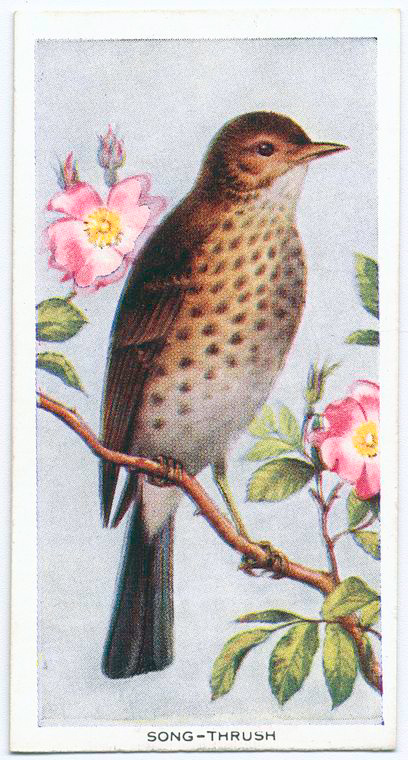


 OUP’s most popular classical music publication had a documentary dedicated to it on BBC TV — “The Lark Ascending: the nation’s favourite piece of classical music” discussed the history of the work, and also included a complete performance of the fantasia for solo violin and orchestra.
OUP’s most popular classical music publication had a documentary dedicated to it on BBC TV — “The Lark Ascending: the nation’s favourite piece of classical music” discussed the history of the work, and also included a complete performance of the fantasia for solo violin and orchestra.








